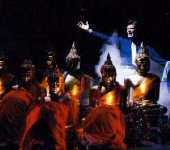Commentary - The Sydney Version

British musicals have always played well in Australia. Shortly after it opened in London, Chess was optioned for Australia. Tim Rice always felt Jim Sharman directed the definitive version of Superstar. Sharman, a respected Australian theatre and cult film director (The Rocky Horror Picture Show) wanted to try his hand at Chess and Rice was happy to comply. "We have tried to keep the emphasis on the score so that it doesn't wind up being a play with music and I think we have achieved this." The whole show was set in Bangkok over a two-week period. Florence was again the pivot of the story but Freddie took an active part in the second act since the action was continuous. Rice had done rewrites for New York which were never used; this was an ideal place to try them out. Though many critics felt the show should be "frozen" in the Cold War years, Rice decided to update it.
But there was--yet again--a rocky road to the premiere. The original backers went bankrupt (ironically, from a failed Australian tour of Starlight Express), the first producer defaulted on the option and the second one died. New ones were found and the original Melbourne theatre replaced by one in Sydney. The opening was scheduled for February 1991. Would this be a repeat of the chaos preceding the London opening?
No. The opening was a smash. "Boffo," said Variety. This Chess bore little resemblance to the high tech behemoth of London and wasn't even a distant relative of Trevor Nunn and Richard Nelson's New York political tract.
Authors are seldom able to repair their own ailing works, but Rice subjected his wayward creation to relentless scrutiny and ruthless surgery. "I rediscovered my characters again. I hadn't seen them for years. As I was working, I even remembered why I had a particular character say a particular line. It was a revelation."
The updating included some references to glasnost which were not only amusing but vague enough to encompass any but the most severe upheavals in the former Soviet Union for some time. Florence was now a Czechoslovakian refugee, her father a well-known chess champion who died in the 1968 uprising.
Rice downplayed the East/West conflict, the screaming reporters and most of the chess. He put the emphasis on the characters, who became more interesting, identifiable, likeable, and emotional. Sharman nearly dumped them in his audience's lap, letting them share their heartbreak, feel their anger and watch them sweat. And this Bangkok was not the steamy, sleazy, slick Bangkok of past versions, but a city of wit and delicacy, displayed using both picture postcard visions and the choreographic stylizations of ancient rituals and martial arts.
The main set was a U-shaped grey-green marble hotel lobby three stories high and lined with louvered doors. Two cylindrical glass elevators whisked actors through the triple-tiered playing surface. The lobby floor concealed a large hydraulically-powered trap with a self-contained revolve. It rose, fell and turned, each time bringing a new setting up to stage level. Over it all, a full-stage-sized underlit chessboard slid downstage for scenes which called for more abstract staging.
Instead of a love triangle, this Chess is a show about couples--constantly shifting duos. The men are united by love, divided by sport. The women are united by impatience with a calling which demands their men place relationships on hold. They all suffer heartbreak and triumph, but only the women know what this has cost them all.
The Arbiter and the chorus acted together as narrators. A musical through-line was accomplished using the "One Night in Bangkok" tune. Rice says, "It always seemed like a top-of-the-chart song we thrust into the show. It wasn't, but it always felt that way. I tried to change that." In Sydney, it anchored the entire score, recurring in different tempos throughout the show.
Sharman's youthful cast (all in their early 20's) and Rice's updating propelled the show into the 90's. Ending the first act with everyone's life in disarray was dramatically effective. "Someone Else's Story" worked well for Svetlana. It was originally written for Florence but partially duplicated the meaning of another of her songs. All of Rice's new lyrics clarified and illuminated the story.
The box office took off after opening and the advance passed A$2.5 million. The Sydney production gave Chess a new life few would have believed possible. The real tragedy is, it is essentially the rewrite Tim Rice gave to Bernie Jacobs and Trevor Nunn back in 1987. If they had used it, Chess might still be running in New York.
Unfortunately, some months later, elections took place in Australia and a different party took power. The economy plummeted, and both a planned recording and the show itself ended as Australian audiences found themselves in uncertain economic times and with little disposable income.
|


| | 